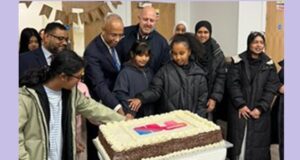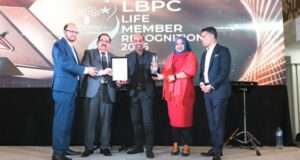 Emdad Rahman interviews Bishop Adrian Newman of Stepney.
Emdad Rahman interviews Bishop Adrian Newman of Stepney.
Bishop Adrian Newman is the Suffragan Bishop of Stepney. He was an economist before he became Vicar of Wadsley Bridge. He was Rector of St Martin-in-the-Bullring, Birmingham from 1996 to 2004, before being appointed Bishop of Rochester. Newman was conferred with an Honorary Fellowship of Canterbury Christ Church University in 2009.
In 2011 Downing Street announced Bishop Adrian’s successful nomination to take over from Stephen Oliver as the new Bishop of Stepney. Richard Chartres, the Bishop of London, consecrated Bishop Adrian as Suffragan Bishop of Stepney in the Diocese of London in July 2011.
Bishop Adrian has quickly settled into his new surroundings: “I fell in love with the locality as soon as I returned to the east end. It felt right and I felt at home. When I was first ordained I worked in Forest Gate in neighbouring Newham. I love the vibrancy and diversity this borough provides. It is challenging, while at the same time very attractive and stimulating. I am a city animal by nature and I am very comfortable here.”
Bishop Adrian has ideas on fostering sound community relations. “I’d like to mention two things. First, it is essential that we make the effort to meet people, go out into the community and make a real effort to really know and understand our neighbours and fellow citizens.
“Secondly, I greatly encourage individuals to participate in activities, deeds and initiatives that promote interfaith awareness and understanding whether it is through serving the homeless at soup kitchens, supporting those with drug and alcohol addictions or becoming involved in action projects through which we can collaborate together.”
In 2012, with the importance and reliance on religion and faith being negatively scrutinised and questioned on a daily basis, many are beginning to question or wane in their faith. Others see religion as a burden and steer clear altogether. The question on the lips of many, therefore, is whether religion, prayer and faith are important to us in this day and age. Bishop Adrian makes a few clear points: “In our shared world it is important to work together to meet ends, share objectives and bring ourselves together. Such unification in a common cause would make it extremely hard for us to be divided.
“Faith unites us with something that is common. In an increasingly secular world there is something profoundly interesting in a common view that people are actually united with a common purpose – and that is to recognise and worship God.
“Religion is amazingly important, even more so in the modern day. Back in the ’90s when Henry Kissinger wrote his masterful book about international politics, he did so without mentioning religion in 900 pages. You couldn’t do that today because our religious culture increasingly and overwhelmingly dominates each and everything that we do in our daily lives.
“With the hustle and bustle, and break neck speed of our daily routines, I think we have lost touch with our spiritual side. We are not on different sides of the fence but united in believing in something transcendent, something which is so much bigger than us and this is something the western world needs to understand.”
The Bishop of London, Dr Richard Chartres, welcomed the announcement of Adrian Newman’s appointment as Bishop of Stepney at the time, saying. “Adrian Newman’s experience exactly matches the needs of the Stepney Area, as identified by the Area Council. He has extensive, personal inner city experience and chose to spend his sabbatical looking at the challenges of urban church life, following the Faith in the City report. I am delighted that Adrian has accepted my invitation to join the London team. He has much to offer this Diocese – not least his own sporting prowess, with the 2012 Games in mind.”
Bishop Adrian, who has run the London Marathon, is an instantly likeable character and a football lover to boot. He’s not perfect, though. His first football allegiance is dedicated to Vicarage Road and the crew from Watford. Although he has a soft spot for West Ham too, Bishop Adrian hopes the Hornets can again reach the heady heights of the ’80s when they were managed by Graham Taylor, the likes of Mo Johnston, Steve Sherwood, Nigel Callaghan, David Bardsley, Luther Blissett, John Barnes and Kenny Jackett ruled the roost.
Bishop Adrian took a sabbatical in 2010 to research the role of the Church in addressing urban poverty. His view on community service was shaped early on in his life when, as a 17 year old, he worked at a hostel for the homeless: “It changed my perception forever,” he said.
Bishop Adrian’s new community is not without its issues and I carry out a quick spot test. He is aware and has constructive suggestions: “We are faced with common issues on a very frequent basis. There are daily issues that require attention, things such as education, training, jobs, housing, community safety, giving young people hope and a future, and learning to live together. I’m a great believer that to be truly effective in life we must plan locally to achieve nationally. I believe that regional planning and activism is a better strategy to tackle overall issues we face. Career schemes to create local economic activity can greatly help to improve unemployment on a local level.
“Opportunities are out there and if people of good will come together and work collectively for the greater good of society we will reap wonderful benefits. Generations of our young people face unemployment and it is imperative that we do all that is possible to harness their enormous talent, harvest their energy and best utilise their passion for the good of society.”
Bishop Adrian’s brief is to build bridges. “I remain committed to our communities, the Mosques, Churches, and the Temples, and all religious and non religious establishments. We must build windows, not doors.”
 East London News A Force for the community…
East London News A Force for the community…



